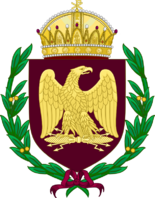User:Latium/Sandbox4
| This article is part of a series on the |
| Politics of Latium |
|---|
 |
Imperial court (Latin: Curia imperialis), formally referred to as the Most Blessed Court of Purple, or more informally as the Government of Latium, is a collective of agencies, individuals, and offices that serve as the government of Latium. At the head of the central government is the Emperor, and below him are numerous Court officials to support the administration of the executive through the complex and extensive bureaucracy. Along with being the primary administrative apparatus of the Emperor, court also consists of the Imperial household and its own administrative offices to support the Emperor and the Imperial Family.
Court is a broad term that may also refer to any other individuals that attend to the Monarch and his or her family, retinue, nobility, individuals with court appointments or informal advisors, and may also include emissaries from other nations or visitors simply to the court. Historically, court has hosted exiled members of deposed governments. Over the nearly two thousand year history of the empire's existence, many changes have taken place and titles and offices have been adopted or discarded.
The Sacred Assembly and College of Praetors comprise the main executive organ of the government, presided over by the Emperor.
History
The court system of government was first established by Emperor Iovinus in the 4th century AD, instituting a variety of civil and military titles, whereby noble rank was afforded based on membership in the Senate. By the 6th century and due to the loss of territory, a new court system was introduced and began to oversea the ancient and elaborate administration. This period saw the introduction of the new title comes (companion of the emperor), which was a prestigious rank afforded to offices within court. This rank was most notably associated with members of the newly established Sacred Assembly, which became the Emperor's chief means of governing.
This period saw the rise of a new aristocracy, though continued to incorporate many of the Gentes Maiores families, such as the X, Y, and Z. As time passed, new titles displaced older titles, or older titles would absorb the duties of another, including the Master of Offices. Originally the Over civil nobility and military hierarchy were distinguished, though both came to consist of intertwined groups. Unlike other Belisarian states, the nobility had no military forces of their own, however they often owned extensive land holdings.